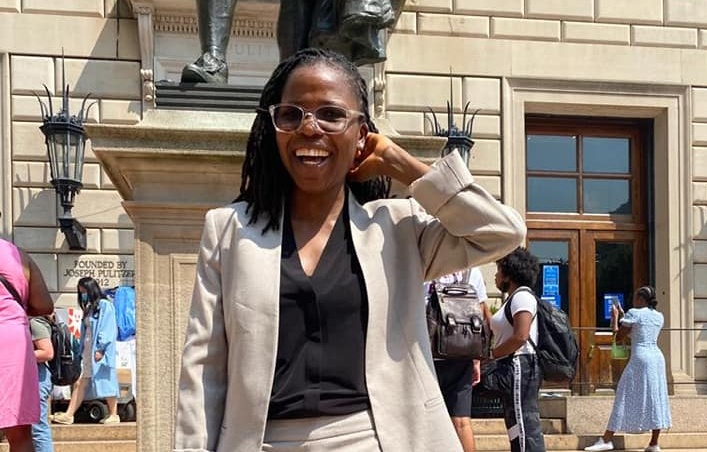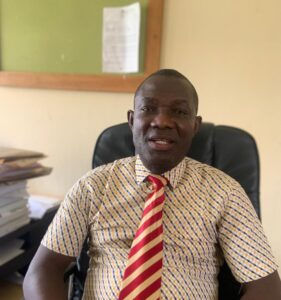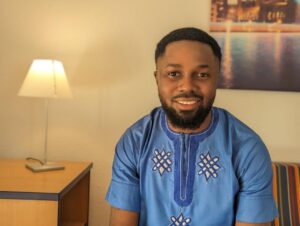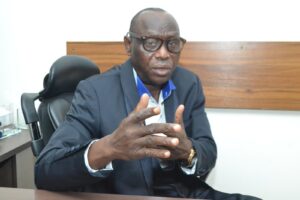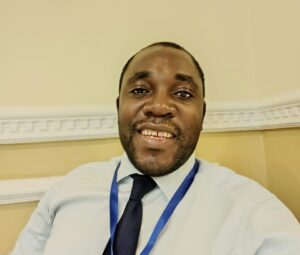Banjo Damilola is an award-winning Nigerian investigative journalist. She had worked with Sahara Reporters and the British Broadcasting Corporation (BBC). A year ago, Banjo enrolled for a Masters Degree at the Columbia Journalism School, one of the oldest journalism schools in the world, located in New York, United States of America (USA).
In this online interview with Raphael Adenaike she spoke on her experience studying in the institution, her career prospects et al.
You recently shared pictures of yourself announcing the conclusion of your Master’s Degree at the Columbia Journalism School.
Compared with Nigeria, your home country, how was your experience studying in the US?
It’s was great. The learning experience was nothing like I have seen in Nigeria. The infrastructure is the best. I had classes that I can actually see how useful they will be to me on the field. I was taught by people who were great journalists themselves. The professor who took my reporting class is a great journalist and documentary filmmaker. She has done some of the best works in American journalism and won several awards including Emmy and Peabody. We had experts come in for seminars.
We were given devices to work with. I had complete recording gear for both video and audio classes. But apart from all the facilities and the quality of education, you also have lecturers who genuinely care about you. The career department truly wants to see you succeed after you graduate. There are internship opportunities and career fairs where people actually got jobs. I must say that I was lucky to have had lecturers like Professor Ayo Ojebode during my undergraduate days at the University of Ibadan.
Lecturers, who took interest in my success beyond just passing their courses. But if I am being honest, my experience during my undergraduate days is not the norm in Nigerian schools. Students are fearful of lecturers who see themselves as demi-gods and take pleasure in failing their students. Lecturers actually brag that no one can score an A in their courses. It is different at Columbia University. My professors see our success as theirs. I think Nigerian lecturers, teaching in Nigerian Universities need to learn that culture.
You were a practising journalist in Nigeria before you moved to the US to study at the Columbia Journalism School. We understand that you resigned from your job at BBC before you travelled to the US.
What informed this decision?
I needed to go to school and I had not spent a year at the BBC. If I had, I would have been able to apply for study leave. The resignation was the only option available to me, and I took it.
Could you share with us, the new skills you have learnt and what you have had to unlearn in journalism?
I am looking at pivoting. I want to try my hands on audio storytelling. It is one skill that I picked at the J-school. I have had to unlearn so many things. I have a very unique start at journalism. Those who know me closely understand this. But while I am grateful for the opportunity, I needed to adopt some standard practice if I will operate at the level I want to. So, I will say getting acquainted with some international standard practices was both a learning and unlearning process for me.
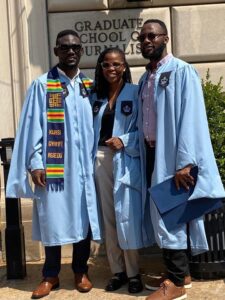
While studying at the Columbia Journalism School, were you able to do any investigative stories? If yes, kindly share with us.
Yes. I was able to complete an investigation I started before leaving for the J-school. It was aired on Rhythm FM on the 3rd of October. It is a riveting story about the ordeal of Endsars protesters at Ajegunle. I also was able to publish two other stories on US immigration. J-school was very intense so being able to do those works means a lot to me.
What would you say were your memorable moments in the Columbia Journalism School?
I think wearing an academic gown for the first time would be the most memorable experience for me. I have always missed the opportunity to wear one. I did not attend both matriculation and graduation ceremony during my undergraduate days in UI. When I started my master’s in UI, I also did not attend the matriculation. So, being able finally to wear an academic gown made me very happy.
What was your challenging moment studying in the US?
I will say having to combine the intense academic endeavour that J-school was with trying to source money to complete my tuition was really stressful.
Could you briefly tell us, your career prospects following your graduation from the Columbia Journalism School?
As I said, I am looking to pivot to audio so many of the old job opportunities that I would have jumped at before J-school are no longer very appealing to me. But, I am excited about the next phase of my career and willing to take more risks.
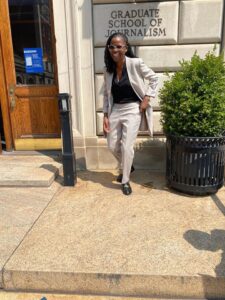
You said that you look to pivot to audio. Do plan to do this in Nigeria or the US?
Nigeria will always be home but I’m keeping an open mind.
How do you plan to impact the media industry with your new journalism skill?
There is a huge gap in Nigeria when it comes to audio storytelling. We have lots of radio stations but hardly any serious journalism content. And with the penetration that radio stations have in Nigeria, we can be doing a lot more than we are currently doing with audio. I am hoping to change that.
What advice do you have for journalists on how to enhance their careers in a time of economic challenges and digital disruption?
Tell stories beyond the routine 500 words breaking news. “Fortune favours the brave” is a saying I learnt from a journalist I used to respect so much. Be brave. Take risks. Apply yourself. Learn new skills. Become a well-rounded journalist.
What would you like to add?
Write for an international organisation at least once in your career. Apply for fellowships and awards. Don’t listen to anyone telling you fellowships and awards don’t matter. They do! Yes, your work as a journalist is the most important but those fellowships are opportunities to get better at your craft. You don’t do the stories for the awards but awards look good on your wall and have a way of spurring you up when those occasional doubts creep in. I should also say that when you apply for these opportunities, you will get many no. If your luck is similar to mine, you will probably get more rejections but the few acceptances are always worth the tons of rejection. So, don’t ever give up. Finally, fight for your career and your byline!
